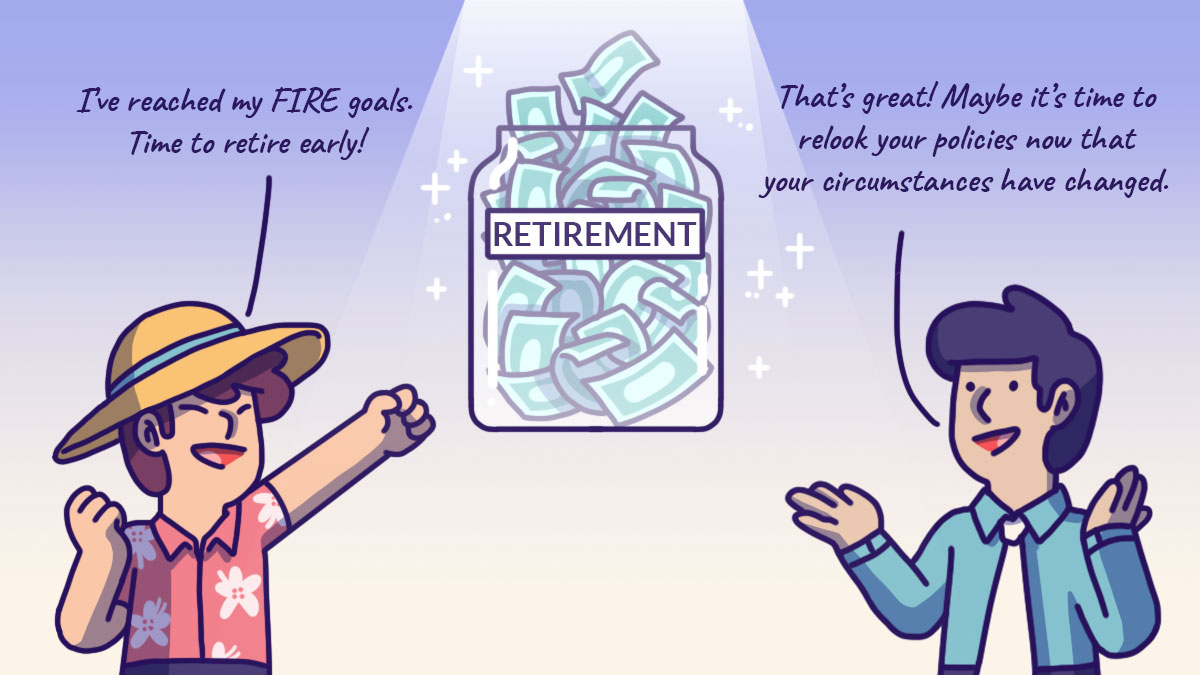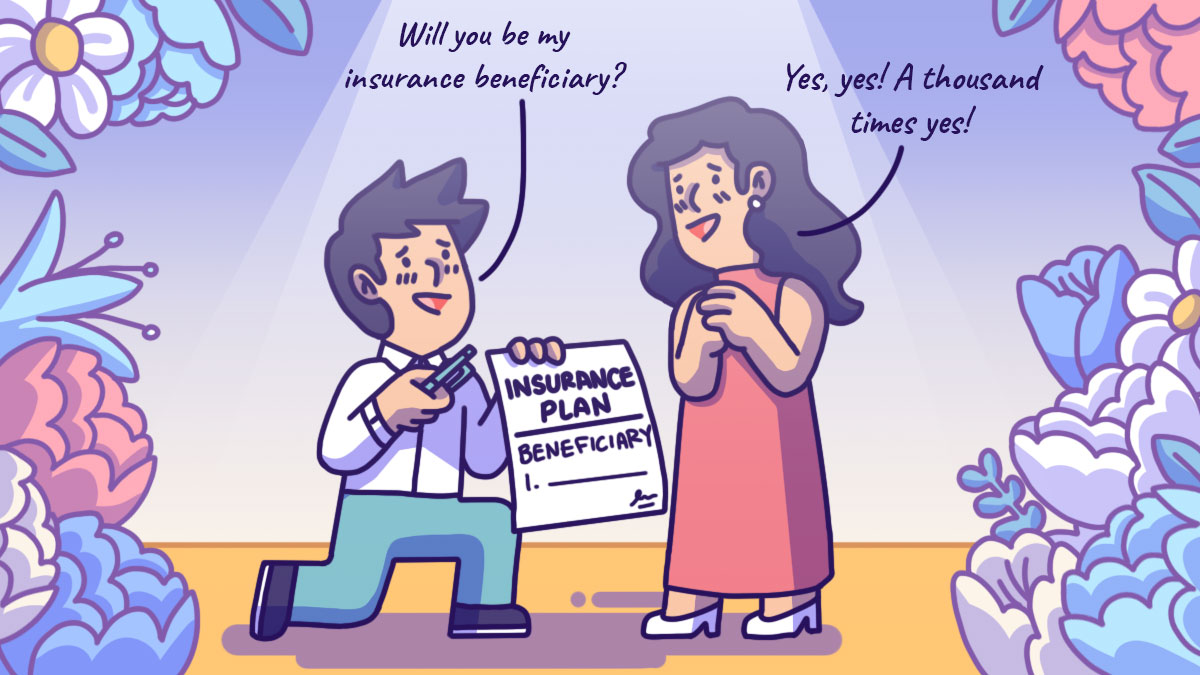Financial Planning | Personal Finance | Article
Does Reviewing Your Insurance Coverage Really Matter?
by Sophia | 17 Oct 2022 | 13 mins read

This article is brought to you by Etiqa
So, you’ve finally found the right agent…along with the right policy. You’ve taken pains to make sure that you weren’t being strung along with a policy that didn’t suit you. At long last, the great hurdle of getting your insurance coverage has been overcome! You’ll never have to take a second glance at them ever again!
Well, if you thought that planning your insurance is just a one-and-done deal, think again.
But before you let your inertia overwhelm you at the thought of (again), remember that your life isn’t a single, drawn-out event that will never change. And if your life is always subject to change (big or small), your insurance coverage needs to keep up with those changes. Regularly reviewing your insurance plans ensures that you’re sufficiently covered – not too much and not too little – no matter where you are in life.
To prove our point, we asked our team members when they reviewed their insurance and, most importantly, why.
1. When big changes come knocking on your door
When your life goes through a dramatic change, like when you finally make things official with your forever-spouse, taking stock of your insurance coverage helps you determine if it’s going to serve you (and your spouse) adequately in the years to come. Priscilla, our newly married Creative Lead, sat down with her insurance agent to review her policies after she got married.
P: My agent told me I needed to submit nominations for my beneficiaries, and I wanted to do it after I got married.
TSS: Why only after you got married?
P: I’d only list my husband as one of my beneficiaries so he would receive payouts after I die—but only if we were married.
TSS: True love!
P: Haha, yeah. At the same time, I also remembered that I actually had a life insurance policy, but I’d forgotten the specifics of its coverage.
TSS: Why was it important that you knew the specifics of your coverage?
P: I wanted to know how much I was being covered for, and what I was covered for. I wanted to see if I could surrender that policy since I don’t have plans to have children in the near future, and my parents have told me that their finances are pretty much settled… or so they tell me. So that means I won’t be having any dependents, at least for the time being.
TSS: Did you surrender the policy in the end? What happened?
P: I ended up keeping it! My life insurance policy also covers critical illness.
TSS: It’s good that you checked, then!
If, unlike Priscilla, you do plan on having more dependents (i.e. having a truckload of children), your insurance policies need to be adjusted accordingly to account for all of them, should something untoward happen to you. Better to be safe than sorry, and to make sure anyone depending on you financially will be well taken care of after the fact. That’s just life!
2. When your expenses change, and you’re spending more money
We often prep for the drastic changes in our lives but there’s one change we hardly think about – a change in our spending patterns. Most people’s expenses tend to increase as they get older, earn more money, have more commitments, and dependents. As Nicole, our Head of Learning and Partnerships, climbed up the ladder in her career and got older, it wasn’t just her income that increased, but her expenses too.
N: My lifestyle definitely changed throughout the years I’ve lived in Singapore. When I first moved, I was making just enough to make ends meet, so I just took on insurance plans that covered the bare minimum because that’s all I could afford. And in any case, my monthly expenses weren’t very high back then so there was no reason to get a plan with very high coverage. Now that I’m earning slightly more and also spending more money, it makes more sense to start filling some gaps in my insurance coverage to give me some peace of mind, like getting early critical illness coverage.
Other things can contribute to a change in your spending, and that also includes marriage, childbirth, and the purchase of property. Basically, if it affects your monthly budget in a significant enough way, and you’re either making a big change or taking on a huge financial commitment in some other aspect of your life, then you need to scale your insurance policies accordingly.
Related
3. If there’s the possibility to save more money
Sometimes, changing one’s policy might guarantee lower premiums as well. It’s good to keep tabs on the market and what products are out there, just in case you can get your hands on a policy that will cover you for the same things–or perhaps even more–for a lower premium. This is something that Nicole does often.
N: One good thing about working in the personal finance space is that I’m exposed to the different products out there. If I can get a better deal on an insurance plan with a different provider, I would talk to my agent about it to see if it makes sense to switch.
Considering how much of our budget will inevitably go into insurance, consistently keeping an eye on your policies will go a long way in helping you save a pretty penny.
Aside from potential cost savings, Tracy, our Sales Representative, looks out for opportunities to grow her money when she reviews her insurance policies.
T: I haven’t felt the need to increase my coverage in a while. Even if I died tomorrow, my family would be able to survive. I don’t have a kid. So, I would really rather allocate more of my funds towards investment policies or investing in general.
TSS: You sound like a big fan of investing.
T: I was always aware of the value of compounding interest, so I quickly bought an investment-linked policy at age 24.
TSS: Why not just invest on your own?
T: I never had the time to learn about stocks, bonds, and basically doing it yourself… I thought it would be much better to leave this to the experts. The great thing was also that in addition to being able to invest my money, there was also protection coverage included with my Investment-Linked Plans (ILPs).
As part of her yearly review with her agent, Tracy also checks the performance of the funds she’s invested in too. After all, if part of your premiums are being put towards growing your wealth, it had better be doing just that.
So, what exactly do you have to account for when you’re reviewing your policies? Fret not, procrastinators–here’s a checklist to make sure you’re covering all your bases:
Related
The types of policies you have
There are different policies covering different things, like term life, critical illness, hospitalisation and more. Just like Nicole, you can review your insurance portfolio to figure out if there are any “gaps” in your coverage and adjust your coverage to cover those “gaps” such that it gives you assurance, if the worst does happen.
The A to Z of your coverage
If you routinely forget the details of your coverage, reviewing it yearly can help you keep track of what’s what. This includes how much your insurance payout will be (in case you need to increase it because you’re taking on more dependents), what you’re covered for and what’s excluded from your policy coverage (so you remember what you can make claims for), and how long you’re being covered for (so you can adjust the coverage period accordingly, for whatever reason).
The cost of surrendering a policy
Don’t ever forget the fine print. Surrendering a policy doesn’t always mean you’ll get money back, and that is absolutely the case for health and term insurance policies. Since they’re mostly geared towards just protecting you, you won’t get any money back by surrendering these insurance policies.
Policies like ILPs, whole life insurance, and endowment plans may have cash values. During your review, ask your agent to help crunch some numbers for you—in particular, your total premiums paid thus far, and the lowest surrender value at that point in time. Remember to factor in hidden fees and extra charges, especially if your policies have a lock-in period.
Whether or not you should dump one policy for another depends on if you can find a cheaper policy that gives you the same amount of coverage and whether you have developed health conditions that may affect your new coverage terms. That way, whatever amount you lose from surrendering your old policy can be recovered over time with a policy that demands a lower premium. It’s not always about getting the cheaper plan, and only that!
Product comparisons
In that same vein, doing an insurance review is a great time to see what other products and policies are out there. Always do your research and shop diligently! If the thought of doing homework gives rise to the cold chill of dread inside you, then rope in your agent or advisor and ask them for help, like Nicole did.
You might even want to go the extra step of talking to more than one agent, just to make sure you’re getting a balanced opinion overall. After all, there are lots of products out there, and you couldn’t possibly wade through all of them alone… can you?
Performance of funds that your policies are investing in
Like Tracy, you ought to also review the performance of the funds your policies are investing in, just to keep track of the way your money is moving. The more data you have on your policies and their respective funds, the better decisions you’ll be able to make for your financial future.
And as surely as we’ll go through different seasons in life, our risk appetites when it comes to investing may change as well. The great thing about ILPs is that there’s an option to switch to a fund that suits your risk appetite better, sometimes at zero cost to you.
Some other things you can look out for during your review is the fees and charges of the funds, if a policy gives you access to special funds that are usually limited to institutional investors, and if the policies provide you with bonus units or cash payout.
If you don’t ever check, then you won’t ever know. Think about all the money you could be growing, or losing, if you decide that regular policy reviews are just not worth your time. That’s time and money you’ll never get back (or never earn, depending on how you look at it). Ignorance may be bliss, but that bliss will come at a great cost.

Your beneficiaries
And finally, it’s important to use the review period to update and revise your list of beneficiaries.
This is especially if you’re taking on additional dependents like a parent you were not previously supporting (whether it’s because they’re finally retired, or a medical event has depleted their retirement savings), or new-borns you’re about to welcome into your world. If your list of beneficiaries dwindles over the years, then you might be able to scale down your coverage as well—and vice versa, of course. At the end of the day, just keep your beneficiaries up to date!
Remember: your insurance plans will follow you throughout your life and must be adjusted accordingly as you change and grow as a person.
It might be depressing to forecast things like inevitable health issues in your later years, but it’s also vital that you look out for your future self and make sure they’re adequately covered before anything even happens. It’s always worth the hassle
Content sponsored by Etiqa
Find out more about Etiqa’s suite of ILP solutions here.
These policies are underwritten by Etiqa Insurance Pte. Ltd. (Company Reg. No 201331905K). This content is for reference only and is not a contract of insurance. Full details of the policy terms and conditions can be found in the policy contract.
An Investment-linked Plan (ILP) invests in ILP sub-fund(s) and investments in this plan are subject to investment risks including the possible loss of the principal amount invested. The performance of the ILP sub-fund(s) is not guaranteed and the value of the units in the ILP sub-fund(s) and the income accruing to the units, if any, may fall or rise. Past performance is not necessarily indicative of the future performance of the ILP sub-fund(s).
A product summary and product highlights sheet(s) relating to the ILP sub-fund(s) are available and may be obtained from us via https://www.etiqa.com.sg/portfolio-funds-and-ilp-sub-funds/. A potential investor should read the product summary and product highlights sheet(s) before deciding whether to subscribe for units in the ILP sub-fund(s).
As buying a life insurance policy is a long-term commitment, an early termination of the policy usually involves high costs and the surrender value, if any, that is payable to you may be zero or less than the total premiums paid. You should seek advice from a financial adviser before deciding to purchase the policy. If you choose not to seek advice, you should consider if the policy is suitable for you. The information contained on this product advertisement is intended to be valid in Singapore only and shall not be construed as an offer to sell or solicitation to buy or provision of any insurance product outside Singapore.
These policies are protected under the Policy Owners’ Protection Scheme which is administered by the Singapore Deposit Insurance Corporation (SDIC). Coverage for your policy is automatic and no further action is required from you. For more information on the types of benefits that are covered under the scheme as well as the limits of coverage, where applicable, please contact us or visit the Life Insurance Association (LIA) or SDIC websites (www.lia.org.sg or www.sdic.org.sg).
This advertisement has not been reviewed by the Monetary Authority of Singapore. Information is correct as at 17 October 2022 .


















